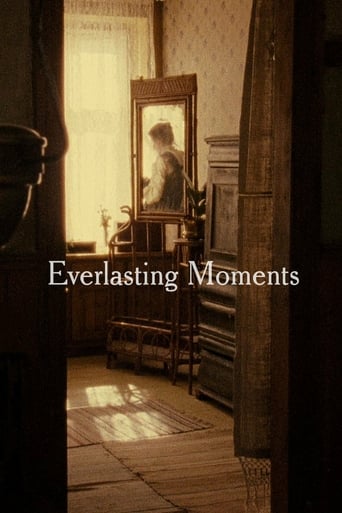dakjets
Good story about life in Sweden in the early 1900s. Here are descriptions good about growing up in the working class, and a turbulent marriage.The film is about Maria Larsson and her family. Although the film is basically a drama about how hard life could be for those who were poor at this time, it is about much more.The film is about following their dreams and how important it is to have real commitment. The protagonist is a fantastic photographer. Life is tough. There are many children as she must take care of. Despite this, we can follow her development and see how her talent evolves over several years.Good person depictions characterizes this drama. Mikal Persbrandt as always good as the rough husband. The film is told through one of their children in retrospective. It works fine.Recommended for those who enjoy good person drama, in a historic setting.
Roedy Green
This is a story of a woman who lives in 1907 in Sweden, married to an abusive, philandering, jealous, alcoholic husband. It is although you took a trip through a time machine. Everything in the grim poverty seems completely real. It has none of that brand-new shininess that period pieces usually have were every building, piece of clothing, car and house is gleaming. She has 7 angelic children. This seems odd since neither of the parents are particularly good looking. An one point we are told we are now 5 years later. Yet the children, replaced by different actors, looked about 14 years older. That was the only time the illusion of reality was broken.Her life is a grind, just barely making do by taking photographs and sewing. It has a surprise happy ending, but even that is snatched away by the grim realities of life in poverty.The children are smug Christians, quick to condemn for breaking biblical commandments. They are quite obnoxious little Puritans.So much goes on in the background. It bit like living in the neigbourhood.The movie is made up of daily small events, one after the other, with a slow heavy pace.My review gives no hint why the movie is so good. It the opposite of Hollywood, the opposite of contrived, the opposite of make believe.
Al Rodbell
As I was watching this touching film for the second time in my living room last night, I commented to my wife, "If this were a Hollywood product the role of the mother would have been played by Michelle Pfeiffer" The investors would have demanded a photogenic star who could ensure financial success.The title "Everlasting Moments" was both the photos that the struggling wife of a violent cheating husband produced for economic and emotional independence; but also the story itself, as told by the oldest girl depicted in the film. Only because it was real, was the overarching cultural imperative of the times to remain in a marriage even if abusive, be convincing. Truth, when honestly depicted, has the capacity to weave together the fabric of a society in a way that is impossible for even the best writers of fiction.This was a clearly defined dramatization of an era, devoid of any synthetic sentimentality that would have ultimately detracted from the inherent humanity of a woman doing what she must, given the constraint of her times. It brought in the historic political forces, a rising communist sentiment that fueled the violence of the abusive husband, depicted in his personal conflict between paternal affection and the desire for a more fully experienced life, a conflict that only was resolved through the release of alcoholic oblivion.Understated, yet fully expressed, was the relationship between the mother and her older photographic mentor. It was a strand during the decade depicted in the film, that was all the more touching for the affection between them being conveyed only through a smile and artistic encouragement.While the words were in Swedish, I'm sure that every nuance came through clearly. We were taken to the Malmo of a hundred years ago, when even a simple photograph was the product of a skilled hand, and an inspired vision. This film, simple yet true, reflected the same spirit.I look forward to the next time I view the film for the additional hidden pleasures that will be uncovered.
Creston Gaither
My ten stars go to the full-length version I saw at an art house last year. I loved it so much I got the DVD (from the UK) -- for which, watch out! It clips about 25 minutes off! The deleted scenes flesh out the male lead's character and the dangerously dark mood of his place and time and thus make him, his marriage, and, thus, Maria, decidedly more complex; they thus make the film more challenging. This regrettable decision dampens down the film's energy and thus, paradoxically, makes it seem slower and longer. As stensson correctly said above, "Not a second too much in any scene" -- so no need for this bad move. Still I'd give even the short version 8 or 9 stars.



